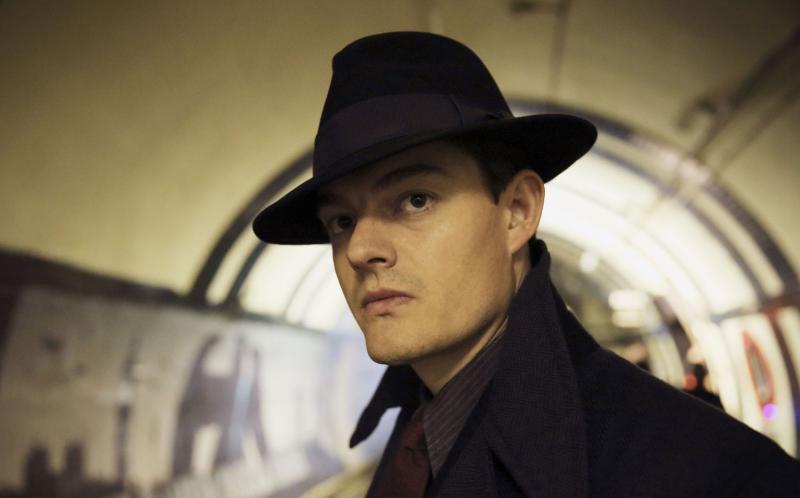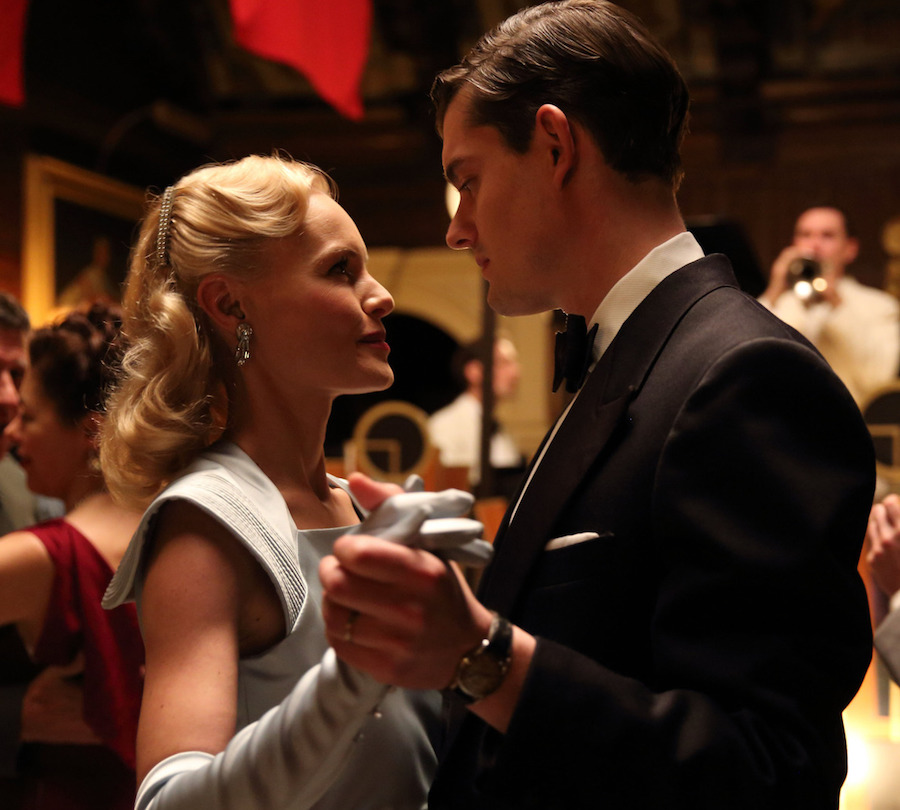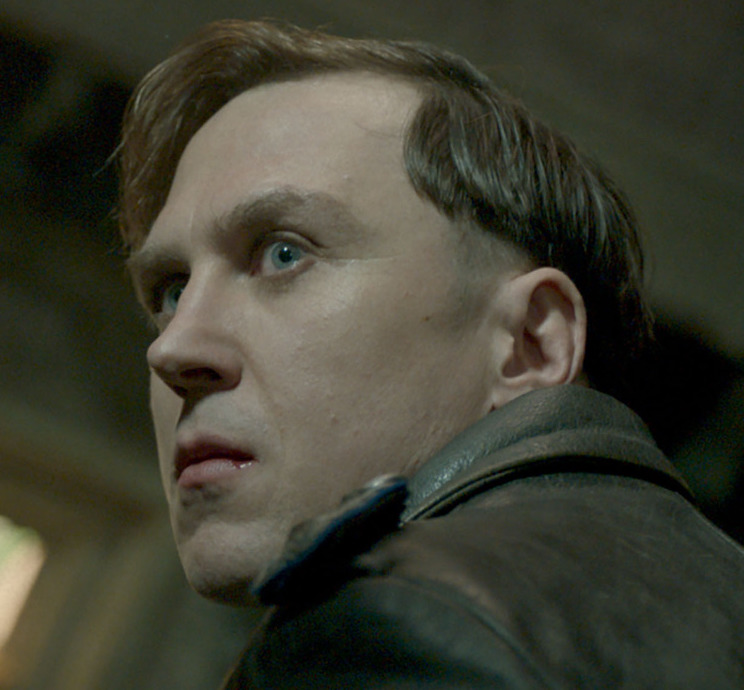SS–GB, BBC One | reviews, news & interviews
SS–GB, BBC One
SS–GB, BBC One
Len Deighton dramatisation depicts the terrors of enemy occupation

“What if the Germans had won the war?” has been a recurring theme in fiction, from Noel Coward’s Peace in Our Time to Philip K Dick’s The Man in the High Castle and Robert Harris’s Fatherland. There was even a predictive pre-war “future history” version, in the form of Katherine Burdekin’s 1937 novel, Swastika Night.
In SS-GB, tellified from Len Deighton’s novel by writers Neal Purvis and Robert Wade (who’ve written all the recent Bond movies), it’s November 1941. The RAF’s famous “Few” having failed to stem the Nazi onslaught – the blackly-ironic opening sequence showed us a Spitfire flown by a German pilot landing in front of a semi-destroyed Buckingham Palace – the Germans are running the country, the ghastly tentacles of the Gestapo and the SS are reaching into every crevice of British life, and Scotland Yard detective Douglas Archer (Sam Riley, pictured below with Kate Bosworth) finds himself a servile lackey of the new regime.
 It was appropriately sordid that Archer’s latest case should be the murder of a man in Shepherd Market, the prostitutes’ haunt now being fashioned into an official Third Reich brothel by the invaders. Intriguingly, though, the pathologist’s inspection revealed that had the victim, Peter Thomas, not died of his bullet wounds, he would have done so fairly soon from liver failure. And not only that, why did he have weird milky eyes? And why was he carrying a rail ticket from Bringle Sands, site of some sort of top-secret airfield?
It was appropriately sordid that Archer’s latest case should be the murder of a man in Shepherd Market, the prostitutes’ haunt now being fashioned into an official Third Reich brothel by the invaders. Intriguingly, though, the pathologist’s inspection revealed that had the victim, Peter Thomas, not died of his bullet wounds, he would have done so fairly soon from liver failure. And not only that, why did he have weird milky eyes? And why was he carrying a rail ticket from Bringle Sands, site of some sort of top-secret airfield?
All will be revealed in due course, but this first episode skilfully lit the fuse on a potentially gripping plot while creating a persuasive atmosphere of depression, desperation and paranoia. Shots of giant swastikas sneering down over Piccadilly Circus and anti-tank obstacles strung across Trafalgar Square provided broody food for thought, while the news that the murder victim had been trading forged Luftwaffe petrol coupons added a note of sweat-stained venality, probably all too familiar to veterans of real-life wars. The building where Archer has his digs now has a “block warden”, and the Nazis are trawling the personal files of Scotland Yard employees for evidence of racial or biological impurities.
 Central to the piece will be that nagging, corrosive question of “what would you have done?” Archer goes about his work trying to convince himself that it’s police business as usual, but with the SS lording it over him and the Gestapo having moved in next door, he has has about as much personal and professional autonomy as a laboratory rat. He has been trying to ease the pain of the death of his wife by having a fling with his assistant, Sylvia (Maeve Dermody), but the revelation that she’s working for the British resistance and views him as a vile quisling has hit him like a slap in the face. Meanwhile, what’s left of the resistance army is fighting a doomed rearguard action somewhere up north.
Central to the piece will be that nagging, corrosive question of “what would you have done?” Archer goes about his work trying to convince himself that it’s police business as usual, but with the SS lording it over him and the Gestapo having moved in next door, he has has about as much personal and professional autonomy as a laboratory rat. He has been trying to ease the pain of the death of his wife by having a fling with his assistant, Sylvia (Maeve Dermody), but the revelation that she’s working for the British resistance and views him as a vile quisling has hit him like a slap in the face. Meanwhile, what’s left of the resistance army is fighting a doomed rearguard action somewhere up north.
Archer himself seems impaled on the dilemma of whether it’s better to bury himself in what can only be an illusion of doing his policeman’s duty, or taking the life-threatening leap of actively working against the occupiers. It’s already clear that there’s much more to the death of Peter Thomas than meets the eye, so much so that one of Himmler’s right-hand men, Oskar Huth, has been dispatched to London to take over the case from Archer’s idle and decadent boss, Kellerman. Huth (pictured above) is played with steely ideological ruthlessness by Lars Eidinger (who has just been starring with Schaubühne Berlin at the Barbican), and somewhat to Archer’s dismay the zealous Huth has adopted him as his pet gofer, to be available around the clock. And what the hell is glamorous American journalist Barbara Barga (a shimmering Kate Bosworth) poking around for? Our policeman’s lot is not a happy one.
The future of Arts Journalism
You can stop theartsdesk.com closing!
We urgently need financing to survive. Our fundraising drive has thus far raised £49,000 but we need to reach £100,000 or we will be forced to close. Please contribute here: https://gofund.me/c3f6033d
And if you can forward this information to anyone who might assist, we’d be grateful.

Subscribe to theartsdesk.com
Thank you for continuing to read our work on theartsdesk.com. For unlimited access to every article in its entirety, including our archive of more than 15,000 pieces, we're asking for £5 per month or £40 per year. We feel it's a very good deal, and hope you do too.
To take a subscription now simply click here.
And if you're looking for that extra gift for a friend or family member, why not treat them to a theartsdesk.com gift subscription?
more TV
 Murder Before Evensong, Acorn TV review - death comes to the picturesque village of Champton
The Rev Richard Coles's sleuthing cleric hits the screen
Murder Before Evensong, Acorn TV review - death comes to the picturesque village of Champton
The Rev Richard Coles's sleuthing cleric hits the screen
 Black Rabbit, Netflix review - grime and punishment in New York City
Jude Law and Jason Bateman tread the thin line between love and hate
Black Rabbit, Netflix review - grime and punishment in New York City
Jude Law and Jason Bateman tread the thin line between love and hate
 The Hack, ITV review - plodding anatomy of twin UK scandals
Jack Thorne's skill can't disguise the bagginess of his double-headed material
The Hack, ITV review - plodding anatomy of twin UK scandals
Jack Thorne's skill can't disguise the bagginess of his double-headed material
 Slow Horses, Series 5, Apple TV+ review - terror, trauma and impeccable comic timing
Jackson Lamb's band of MI5 misfits continues to fascinate and amuse
Slow Horses, Series 5, Apple TV+ review - terror, trauma and impeccable comic timing
Jackson Lamb's band of MI5 misfits continues to fascinate and amuse
 Coldwater, ITV1 review - horror and black comedy in the Highlands
Superb cast lights up David Ireland's cunning thriller
Coldwater, ITV1 review - horror and black comedy in the Highlands
Superb cast lights up David Ireland's cunning thriller
 Blu-ray: The Sweeney - Series One
Influential and entertaining 1970s police drama, handsomely restored
Blu-ray: The Sweeney - Series One
Influential and entertaining 1970s police drama, handsomely restored
 I Fought the Law, ITVX review - how an 800-year-old law was challenged and changed
Sheridan Smith's raw performance dominates ITV's new docudrama about injustice
I Fought the Law, ITVX review - how an 800-year-old law was challenged and changed
Sheridan Smith's raw performance dominates ITV's new docudrama about injustice
 The Paper, Sky Max review - a spinoff of the US Office worth waiting 20 years for
Perfectly judged recycling of the original's key elements, with a star turn at its heart
The Paper, Sky Max review - a spinoff of the US Office worth waiting 20 years for
Perfectly judged recycling of the original's key elements, with a star turn at its heart
 The Guest, BBC One review - be careful what you wish for
A terrific Eve Myles stars in addictive Welsh mystery
The Guest, BBC One review - be careful what you wish for
A terrific Eve Myles stars in addictive Welsh mystery
 theartsdesk Q&A: Suranne Jones on 'Hostage', power pants and politics
The star and producer talks about taking on the role of Prime Minister, wearing high heels and living in the public eye
theartsdesk Q&A: Suranne Jones on 'Hostage', power pants and politics
The star and producer talks about taking on the role of Prime Minister, wearing high heels and living in the public eye
 King & Conqueror, BBC One review - not many kicks in 1066
Turgid medieval drama leaves viewers in the dark
King & Conqueror, BBC One review - not many kicks in 1066
Turgid medieval drama leaves viewers in the dark
 Hostage, Netflix review - entente not-too-cordiale
Suranne Jones and Julie Delpy cross swords in confused political drama
Hostage, Netflix review - entente not-too-cordiale
Suranne Jones and Julie Delpy cross swords in confused political drama

Add comment